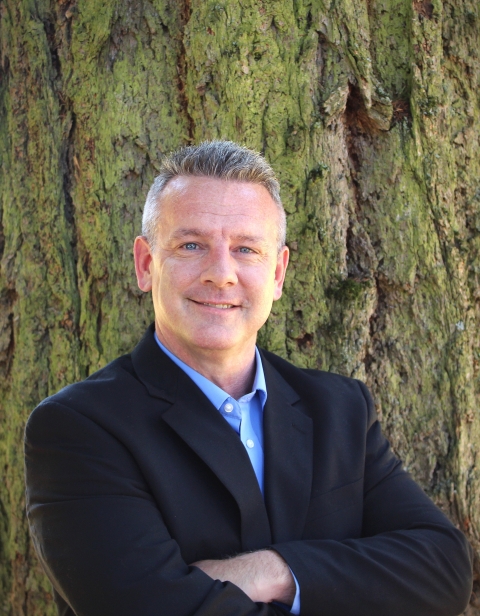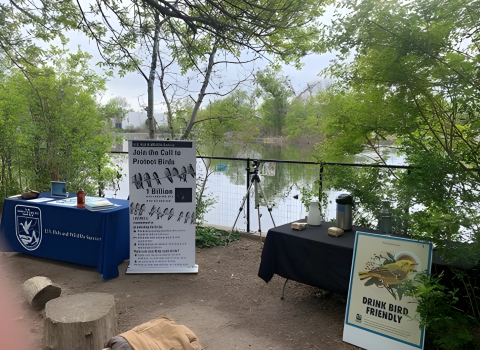Jason Holm learned leadership in the U.S. Army, crisis communications with the U.S. Navy, and put it all together for the past 17 years with the U.S. Fish and Wildlife Service. Serving as Assistant Regional Director for the Office of Communications in the Pacific and Midwest Regions, his first two rules in a media crisis are: 1) tell the truth, tell it first, tell it always; and 2) stay laser focused on the goal of serving the American public.
Holm has been awarded the Distinguished Service Award by the Department of Interior for his 33 years of public service, including nearly 18 years at U.S. Fish and Wildlife Service. The Distinguished Service Award is DOI’s highest honorary recognition, presented to employees for outstanding contributions made during an eminent career with DOI or exceptional contributions to public service.
“Mr. Jason D. Holm is recognized throughout the U.S. Fish and Wildlife Service and the Department of the Interior as a leader in communications. His relentless commitment to the FWS mission, his staff, and the American people has resulted in an exemplary career with FWS spanning more than 17 years,” the award stated. “Through his fundamental belief that we are public servants first, Mr. Holm has focused on developing diverse teams in the Pacific and Midwest Regions that reflect the communities in which Bureau employees live and work and include unique cultural and Indigenous voices. He empowers staff to develop innovative, strategic, and inclusive communications practices, which ensure FWS delivers information furthering its conservation mission where, when, and in ways that the information is most helpful to the American people.”
Pacific Regional Director Hugh Morrison has worked with Holm over the past 14 years and nominated him for the award.
“Jason has been a trusted colleague for a long time,” Morrison said. “Whether it’s a crisis or day-to-day operations of the Pacific Region, I can rely on Jason to provide well-reasoned advice that is bold, insightful and has a unique Jason-esque flair. He is always there for me, his peers, the staff and the public. He embodies the Distinguished Service Award, and has been an outstanding coworker and public servant.”
Holm has long championed the need to be transparent with the public, as well as making sure his teams are reflective of the audiences they serve. He also focuses on encouraging his public affairs staff to tell the Service’s story to the public in a variety of ways, because not everyone has the same perspective and experience.
“It is a surprise and quite humbling to receive this recognition,” said Holm. “It wouldn’t be possible without 33 years of great mentors, forgiving bosses, and immensely talented teams.”
Holm took a few minutes to chat with us to provide his perspective on his career and his team.
Question: Tell us about your military career. How did it influence your experience in the Office of Communications?
Answer: I was an Army Officer for around 11 years, primarily focused in the Pacific Theater. I’ve led small teams, commanded 400 soldiers, and staffed a desk in solitude. I think an Assistant Regional Director for the Office of Communications is most similar to small team leadership in the Army, which gives me the direct interaction, pace and collaboration I love.
I am decisive. The Army teaches rapid decision making – being stationary can be literally dangerous – so I’m comfortable making quick, imperfect decisions and modifying and improving them in motion. Also, soldiers will do heroic, often dangerous tasks if they are informed of the objective and allowed to invest in the mission. I’d like to think I still share that objective with my teams and allow their unique skills and diverse talents to shine.
Finally, my time in the Army makes me grateful for what I have each day. It’s hard to get too incensed about convoluted online processes or mandatory driver’s training when I know there are men and women in harm’s way. Comparatively, my job is easy and my chair is comfy.
Q: You've championed the need to be transparent with the public, as well as making sure your team is reflective of the audiences they serve. Why are those important to you?
A: I believe in transparency because as communicators in the Executive branch, our job is to serve all Americans. As public affairs officers, we don’t spin…we provide accurate facts to the American public and let them decide if they support our desired course of action. Even if (after receiving all the necessary information) they don’t agree with our desired path, public policy is still working.
Building diverse teams is a no-brainer if we hope to communicate with our publics. Additionally, different voices and different styles bring a richness to our craft. If we all look and talk like me, we are limited to the speed of me. How have I succeeded at it? Well, when I joined the agency in 2006, I heard the Director tell agency leaders we needed to evolve to represent a broader public, so I did.
Q: Is there anything about your family you'd like to share?
A: With a wife and three daughters, I have a lot of female influence in my life. They ground me, humble me and, when necessary, make me aware of my flaws. More seriously, they and my faith are deeply intertwined in what drives me each day. I strive to succeed because I’ve always wanted to protect and provide for my family. I also do believe having three daughters has made me fairly protective, and that has translated to admittedly being quite protective of my staff.
Q: What are the crowning moments of your career with the Service? Why are those meaningful to you?
A: Managing the Malheur National Wildlife Refuge crisis was certainly the culmination of years of crisis communications training and experience. I’m really proud that our team mobilized to tell the important story of collaborative conservation in the West.
Also, I had two opportunities to be away from my team in the past year. I missed being in their workflow and hilarious Teams chats, but I was truly proud to watch them step up and help each other succeed. They were professional, unselfish, and, honestly, things ran a bit smoother than when I was at the helm. I have had some amazing teams throughout my career, but my current team is truly a unicorn. They are caring, creative and stone-cold communications professionals, and I can’t wait to see the places they’ll go professionally.
Q: In sports, some coaches are referred to as players’ coaches because their team loves to play for them. Your Office of Communications team feels the same way about you. Why do you think that is?
A: I like to have fun and for the team to have fun. I don’t take myself particularly seriously, and I’m pretty comfortable being fodder for others’ laughter. I also really try to give people room to try and fail, and try again and succeed. I had some pretty forgiving bosses early in my career, and I learned some of my strongest lessons by failing. We also celebrate success, and I’m truly blessed that we’ve had a lot of opportunities to celebrate.
I also learned quickly in the Army that my soldiers often knew better routes to success. Similarly, I want my team to capitalize on the diverse ideas and voices each of us bring to the workplace. I want my team to run at the pace of whoever’s fastest, rather than always run at my pace.
Q: What advice would you give to people considering a career in public affairs?
A: Public affairs is a craft, and it has room for a wide variety of skills. It isn’t just for writers, photographers, artists. You need to be flexible, you need to be adaptive, and it really helps if you can write, but there is room for people in this field who don’t have traditional communications vocation or experience. It is occasionally mundane, but often exciting and (if you are wired correctly) a really fun way to spend a career.



